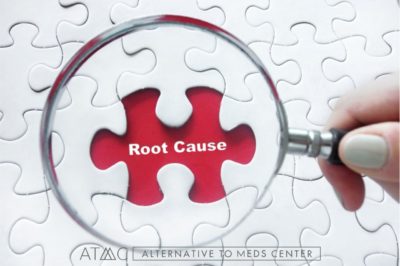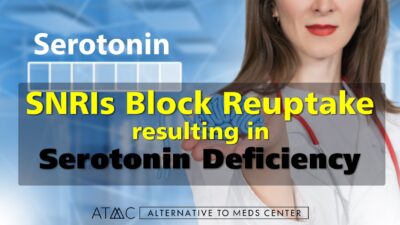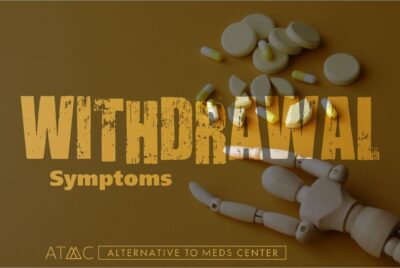Finding and Addressing Root Causes for Depression & Effexor Addiction
Most individuals are put on antidepressant medications like Effexor before there have been any investigative efforts put into finding what is causing their depression. Despite the advertising claims, does the assumed neurotransmitter deficiency really exist? How about food allergies, slow metabolism, low thyroid or toxicity? These are just some of the documented causes and contributors to depression.16-20
 A person may or may not have a deficit in serotonin to begin with, but taking the medication can develop an actual serotonin deficiency that may even make matters worse. Seissner et al’s study on mice demonstrates neurotransmitter deficiency after chronic use of antidepressant drugs in an article published in the 2013 Journal of ACS Chemical Neuroscience.16 Clearly, this drug-induced effect would leave a person disadvantaged, whether or not a deficiency was present before starting drug therapy.
A person may or may not have a deficit in serotonin to begin with, but taking the medication can develop an actual serotonin deficiency that may even make matters worse. Seissner et al’s study on mice demonstrates neurotransmitter deficiency after chronic use of antidepressant drugs in an article published in the 2013 Journal of ACS Chemical Neuroscience.16 Clearly, this drug-induced effect would leave a person disadvantaged, whether or not a deficiency was present before starting drug therapy.
Testing can directly reveal much that is pertinent when it comes to addressing root causes. For instance, a deficiency in folate was corrected with supplementation and was a successful treatment for depression according to a 2011 article published in the Journal of the Canadian Family Physician.13
To address symptoms such as depression, the pharmaceutical industry has been so diligent in their cause, that many alternative treatments have not received the attention and exposure that they deserve. According to the above-mentioned meta-analysis of studies, Canadian researcher Dr. Osmaan Sheikh found that St John’s Wort was as effective as antidepressant drugs in relieving depression, but without the side effects. As reported in the medical literature, exercise was shown to be a highly effective treatment for depression. Similar results have been found regarding certain supplements such as SAM-e, Omega-3 fatty acids, and vitamin D. Additionally, the use of acupuncture treatments, light therapy, and many other depression therapies used in Complementary Medicine have gained popularity in recent times, in both women and men.13,14,15
Does Effexor Raise Serotonin?
SNRI antidepressants do not produce serotonin. In fact, antidepressants block the reuptake of certain natural neurochemicals. This blocking of reuptake causes an artificial but temporary build-up to occur.
However, there is a wrench in the works. Serotonin is designed by nature, for reuptake. This is so the nerve cells that make up the incredibly complex CNS are able to recycle it and use it again and again. This is a conservatory process.
 However, if serotonin is forcibly kept suspended outside the synapse, which is how antidepressants “work,” these molecules eventually degrade and become a waste product. It’s comparable to the way cocaine temporarily relieves depression. Cocaine uses up (burns up, wastes) all of the available dopamine but does not create more of it. Dopamine is the neurochemical that monitors reward, so when a person initially takes cocaine, there will appear to be an exceptional feeling of reward in everything.
However, if serotonin is forcibly kept suspended outside the synapse, which is how antidepressants “work,” these molecules eventually degrade and become a waste product. It’s comparable to the way cocaine temporarily relieves depression. Cocaine uses up (burns up, wastes) all of the available dopamine but does not create more of it. Dopamine is the neurochemical that monitors reward, so when a person initially takes cocaine, there will appear to be an exceptional feeling of reward in everything.
Eventually, all the dopamine will be gone. Now nothing in the world feels rewarding to a person in this condition. This is why it feels like drugs eventually “stop working.” It’s a bit like living off a credit card. Eventually, all resources become bankrupt. The human need for reward is hardwired. This is one of the harshest drivers of addiction because there is a craving and a drive for pleasure and reward, but these rewards end up being less and less available as drug use continues.
Unlike dopamine, an excitatory neurochemical, serotonin could be called a “dampener.” We need serotonin for its ability to not only dampen unpleasant environmental stimuli but to reduce aggression and impulsive behavior. Serotonin also creates our sleep hormones. The effect of adequate serotonin could be compared to shutting the windows and putting a pillow over your head if you live beside train tracks. Serotonin quiets reactions to outside stimuli and settles down compulsive thoughts and behaviors. This is a major neurotransmitter with additional functions that we don’t entirely understand yet, and this hormone travels all over the body along many different pathways that have yet to be fully mapped.
But it is clear to see what happens to a hormonal-impaired person during antidepressant withdrawal. The trains are running, and there is no pillow and the windows are wide open — in fact, the sounds and rattling of the trains are amplified. Therefore, a person can suffer from impulsive aggression, increased reactivity, sleeplessness, anxiety, overstimulation, and some may develop Tourette’s and OCD.
All of these symptoms are associated with a drug-induced serotonin deficiency.21,23
Can Nutrition Raise Serotonin?
 Yes, in fact, nutrition is THE MOST EFFECTIVE way to rehabilitate the entire breadth of functioning human neurochemistry. Alternative to Meds Center identifies medical, biological, nutritional, and psychosocial contributors to depression and other unwanted symptoms. For example, to combat depression during withdrawal, we use targeted nutrient treatments and oral supplements that promote the creation of healthy neurotransmitters that positively support mood. Combined with testing for other potential contributors to unwanted symptoms, medical acupuncture, psychological counseling, neurotransmitter rehabilitation, IV + NAD treatments, nebulized glutathione, deep cleansing, exercise, and Equine therapy provide long-lasting relief. We have over 40 clinical physicians, nurses, and practitioners on board in our pristine and welcoming in-patient facility to provide the vast range of therapies that are instrumental for full, authentic, recovery. Each person’s program must be uniquely designed as no cookie-cutter approach will give the desired result.
Yes, in fact, nutrition is THE MOST EFFECTIVE way to rehabilitate the entire breadth of functioning human neurochemistry. Alternative to Meds Center identifies medical, biological, nutritional, and psychosocial contributors to depression and other unwanted symptoms. For example, to combat depression during withdrawal, we use targeted nutrient treatments and oral supplements that promote the creation of healthy neurotransmitters that positively support mood. Combined with testing for other potential contributors to unwanted symptoms, medical acupuncture, psychological counseling, neurotransmitter rehabilitation, IV + NAD treatments, nebulized glutathione, deep cleansing, exercise, and Equine therapy provide long-lasting relief. We have over 40 clinical physicians, nurses, and practitioners on board in our pristine and welcoming in-patient facility to provide the vast range of therapies that are instrumental for full, authentic, recovery. Each person’s program must be uniquely designed as no cookie-cutter approach will give the desired result.
We invite you to find out more about our Effexor addiction treatment program at Alternative to Meds Center and how it may help you or your loved one with getting life back on track without prescription medications.

 Realizing the need for Effexor addiction treatment can bowl a person over completely. Often, nothing is suspected until the person forgets a dose and suffers a startling cascade of withdrawals. This might be the point where a person realizes how Effexor-dependent they have become. Only then, one realizes how much they have come to rely on it to carry out life’s ordinary daily functions. This
Realizing the need for Effexor addiction treatment can bowl a person over completely. Often, nothing is suspected until the person forgets a dose and suffers a startling cascade of withdrawals. This might be the point where a person realizes how Effexor-dependent they have become. Only then, one realizes how much they have come to rely on it to carry out life’s ordinary daily functions. This  Given the effective tools, it has been our observation at Alternative to Meds Center that there are better methods than a prescription drug to maintain peace and happiness. But many doctors who are licensed to give out medication are never trained in alternative methods to improve mood and related symptoms. We have observed that natural mental health can be achieved without prescription drugs. For many, the fear of ending Effexor dependency is the fear of the potentially painful Effexor withdrawals and the possibility of returning symptoms. Patients have described
Given the effective tools, it has been our observation at Alternative to Meds Center that there are better methods than a prescription drug to maintain peace and happiness. But many doctors who are licensed to give out medication are never trained in alternative methods to improve mood and related symptoms. We have observed that natural mental health can be achieved without prescription drugs. For many, the fear of ending Effexor dependency is the fear of the potentially painful Effexor withdrawals and the possibility of returning symptoms. Patients have described  Tardive Dyskinesia is an involuntary movement disorder and a rare adverse effect that can emerge during or after withdrawal from venlafaxine as well as other SNRI medication. Effexor is known to produce more intense withdrawals than other SNRI medications.11,12
Tardive Dyskinesia is an involuntary movement disorder and a rare adverse effect that can emerge during or after withdrawal from venlafaxine as well as other SNRI medication. Effexor is known to produce more intense withdrawals than other SNRI medications.11,12 A person may or may not have a deficit in serotonin to begin with, but taking the medication can develop an actual serotonin deficiency that may even make matters worse. Seissner et al’s study on mice demonstrates neurotransmitter deficiency after chronic use of antidepressant drugs in an article published in the 2013 Journal of ACS Chemical Neuroscience.16 Clearly, this drug-induced effect would leave a person disadvantaged, whether or not a deficiency was present before starting drug therapy.
A person may or may not have a deficit in serotonin to begin with, but taking the medication can develop an actual serotonin deficiency that may even make matters worse. Seissner et al’s study on mice demonstrates neurotransmitter deficiency after chronic use of antidepressant drugs in an article published in the 2013 Journal of ACS Chemical Neuroscience.16 Clearly, this drug-induced effect would leave a person disadvantaged, whether or not a deficiency was present before starting drug therapy. However, if serotonin is forcibly kept suspended outside the synapse, which is how antidepressants “work,” these molecules eventually degrade and become a waste product. It’s comparable to the way cocaine temporarily relieves depression. Cocaine uses up (burns up, wastes) all of the available dopamine but does not create more of it. Dopamine is the neurochemical that monitors reward, so when a person initially takes cocaine, there will appear to be an exceptional feeling of reward in everything.
However, if serotonin is forcibly kept suspended outside the synapse, which is how antidepressants “work,” these molecules eventually degrade and become a waste product. It’s comparable to the way cocaine temporarily relieves depression. Cocaine uses up (burns up, wastes) all of the available dopamine but does not create more of it. Dopamine is the neurochemical that monitors reward, so when a person initially takes cocaine, there will appear to be an exceptional feeling of reward in everything. Yes, in fact, nutrition is THE MOST EFFECTIVE way to rehabilitate the entire breadth of functioning human neurochemistry. Alternative to Meds Center identifies medical, biological, nutritional, and psychosocial contributors to depression and other unwanted symptoms. For example, to combat depression during withdrawal, we use
Yes, in fact, nutrition is THE MOST EFFECTIVE way to rehabilitate the entire breadth of functioning human neurochemistry. Alternative to Meds Center identifies medical, biological, nutritional, and psychosocial contributors to depression and other unwanted symptoms. For example, to combat depression during withdrawal, we use 







